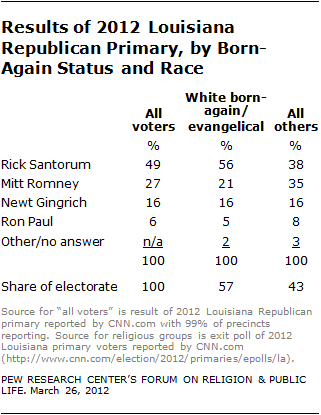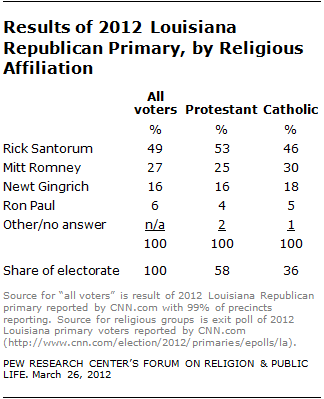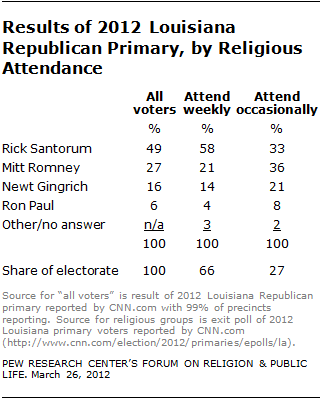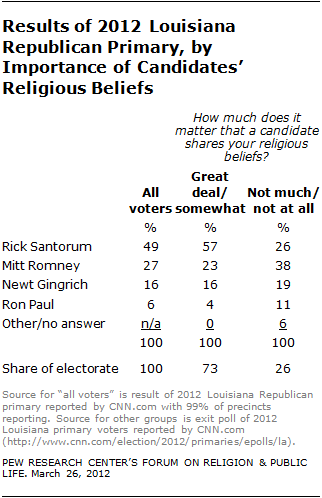Rick Santorum won the Louisiana Republican primary on Saturday by 22 points over Mitt Romney, his closest competitor. Newt Gingrich finished in third place in Louisiana and Ron Paul finished fourth. Santorum won the majority of votes cast by white evangelical/born-again Christians, people who attend worship services weekly and voters who say it is at least somewhat important to have a candidate who shares their religious beliefs. A Catholic himself, Santorum also won a clear victory among Catholic voters for the first time this primary season.
Voting by Born-Again Status
White evangelicals accounted for nearly six-in-ten Louisiana primary voters, and a majority of them (56%) voted for Santorum.1 Romney (who received 21% support from evangelicals) and Gingrich (16%) tied for second among Louisiana evangelicals, while Paul received 5% support from this group.
Non-evangelical voters were closely divided between Santorum (38%) and Romney (35%). Gingrich received 16% of non-evangelicals’ votes, while Paul garnered 8% support from this group.

Voting by Religious Affiliation and Worship Attendance
Santorum won clear victories among both Protestant and Catholic voters in Louisiana.2 Roughly half of Protestants (53%) supported Santorum, more than twice the number who voted for Romney (25%) or Gingrich (16%). And Santorum received almost as much support from Catholics (46%) as he did from Protestants. Three-in-ten Louisiana Catholics voted for Romney, while 18% supported Gingrich.

Santorum received nearly three times as much support as Romney from regular churchgoers in Louisiana. Nearly six-in-ten Louisiana voters who report attending religious services at least once a week voted for Santorum (58%). One-in-five regular churchgoers voted for Romney (21%), while 14% supported Gingrich. Those who attend religious services occasionally were much more closely divided, with 36% voting for Romney and 33% for Santorum.

Voting by Importance of Candidates’ Religion
Santorum was the favorite of Louisiana GOP voters who said that it matters a great deal or somewhat that a candidate shares their religious beliefs. He garnered majority support from this group (57%), including 67% support from those who say it matters “a great deal” to have a candidate who shares their religious beliefs. Among voters who attach little or no importance to having a candidate who shares their religious beliefs, 38% voted for Romney, while 26% supported Santorum, 19% voted for Gingrich and 11% backed Paul.

This analysis is based on results from exit polls conducted as voters left the polls during the Louisiana Republican primary election. The polls were conducted by Edison Media Research for the National Election Pool. Full results and additional details from the Louisiana exit poll can be accessed at http://www.cnn.com/election/2012/primaries/epolls/la.
This analysis is based on exit poll data that were available as of 8:00 a.m. on March 26. Exit poll data are sometimes reweighted, so some figures may be different from those available on CNN.com.
Footnotes:
1 Voters can describe themselves in exit polls as born-again or evangelical Christians regardless of their religious affiliation, meaning that the born-again/evangelical category likely includes not only Protestants but also some Catholics and even some voters who say they have “no religion.” (return to text)
2 The Louisiana exit poll included too few interviews to permit analysis of voters from religious traditions other than Protestantism or Catholicism. (return to text)
Photo Credit: Panoramic Images
